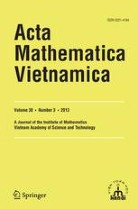
Acta Mathematica Vietnamica
- Volume 50
- Volume 49
- Volume 48
- Volume 47
- Volume 46
- Volume 45
- Volume 44
- Volume 43
- Volume 42
- Volume 41
- Volume 40
- Volume 39
- Volume 38
- Volume 37
- Volume 36
- Volume 35
- Volume 34
- Volume 33
- Volume 32
- Volume 31
- Volume 30
- Volume 29
- Volume 28
- Volume 27
- Volume 26
- Volume 25
- Volume 24
- Volume 23
- Volume 22
- Volume 21
- Volume 20
- Volume 19
- Volume 18
- Volume 17
- Volume 16
- Volume 15
- Volume 14
- Volume 13
- Volume 12
- Volume 11
- Volume 10
- Volume 9
- Volume 8
- Volume 7
- Volume 6
- Volume 5
- Volume 4
- Volume 3
- Volume 2
- Volume 1
A General Estimate for the $\bar \partial$-Neumann Problem
Tran Vu Khanh
Abstract
This paper especially focuses on a general estimate, called $(f-\mathcal M)^k$, for the $\bar \partial$-Neumann problem
$${(f-\mathcal M)^{k}} \qquad \| f({\varLambda })\mathcal M u\|^{2}\le c(\|\bar \partial u\|^{2}+\|\bar \partial ^{*}u\|^{2}+\|u\|^{2})+C_{\mathcal M}\|u\|^{2}_{-1} $$
for any $u\in C^{\infty }_{c}(U\cap \bar {\Omega })^{k}\cap \text {Dom}(\bar {\partial }^{*}) $, where f(Λ) is the tangential pseudodifferential operator with symbol $f((1+|\xi|^2)^{\frac 1 2})$, $\mathcal M$ is a multiplier, and U is a neighborhood of a given boundary point $z_0$. Here the domain Ω is q-pseudoconvex or q-pseudoconcave at $z_0$. We want to point out that under a suitable choice of f and $\mathcal M$, $(f{-}\mathcal M)^{k} $ is the subelliptic, superlogarithmic, compactness and so on. Generalizing the Property (P) by Catlin (1984), we define Property $(f-\mathcal M-P)^{k} $. The result we obtain in here is: Property $(f-\mathcal M-P)^{k} $ yields the $(f-\mathcal M)^{k} $ estimate. The paper also aims at exhibiting some relevant classes of domains which enjoy Property $(f-\mathcal M-P)^{k} $.


